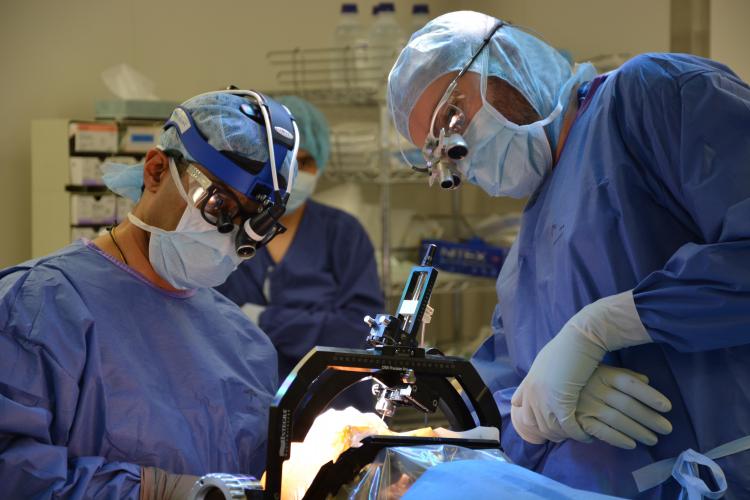Parkinson's Stem Cell Research
WORLD-FIRST PARKINSON'S STEM CELL TRIAL
Medical researchers at The Royal Melbourne Hospital (RMH) have trialed a new revolutionary type of stem cell that is injected into the brain as part of a world-first clinical trial in Parkinson's Disease.
The phase one study, uses neural stem cells derived from unfertilized eggs and manufactured in the lab by a biotech company in California.
Lead researcher, RMH Neurologist, Dr Andrew Evans, said a 64-year old Victorian man was the first patient to receive the neural stem cells in a delicate operation performed by RMH Neurosurgeon, Mr Girish Nair, that lasted more than five hours.
“The first patient’s operation was a success, however we won’t know for 12 months the effects of the stem cell implants and if we are on the verge of a new treatment for Parkinsons,” Dr Evans said.
“The first phase is critical for us to understand the right amount of neural stem cells required to be injected into the brain. The three different doses range from 30,000,000 to 70,000,000 neural cells and of those, only a very small percentage will become dopamine.
“Dopamine is a hormone that transmits information between brain cells and is one of the most critical transmitters in the brain that is lost with Parkinson’s disease.”
Parkinson’s disease is a progressive, degenerative neurological condition that affects a person’s control of their body movements. In Australia, there are approximately 80,000 people living with Parkinson’s. Currently, there is no cure for Parkinson’s disease.
“The stem cells entered the brain through two 1.5cm holes in the skull and we targeted 14 sites on the brain and each injection had to be spaced four minutes apart,” Mr Nair said.
“Following transplantation, patients will be monitored for 12 months at specified intervals, to evaluate the safety and the effects of the neural stem cells. PET scans will also be performed at various times during the study to see if the transplanted stems cells have taken effect.
“At the end of the study we will have transplanted tens of millions of neural stem cells directly into the brains of the 12 Australian participants. Hopefully this will go a long way into understanding how we can replenish brain function for people with Parkinson disease.”
A further 11 patients will undergo the operation in 2017 with the results expected in 2019.
Specialist medical equipment for the study was purchased by the Royal Melbourne Hospital Neuroscience Foundation.
The Royal Melbourne Hospital Neuroscience Foundation
RMH Neuroscience Foundation
PO Box 2116
Royal Melbourne Hospital VIC 3050
In the spirit of reconciliation, the Royal Melbourne Hospital Neuroscience Foundation acknowledges the Kulin nations as the Traditional Custodians of the land on which our services are located. We are committed to improving the health and well-being of Aboriginal and Torres Strait Islander peoples, as with all Australians.
Follow Us
Website by:
Melbourne IT


